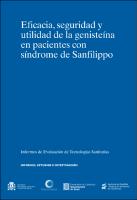| dc.contributor | Departament de Salut |
| dc.contributor.author | Roqué-Fíguls, Marta |
| dc.contributor.author | Solà-Arnau, Ivan |
| dc.contributor.author | Requeijo-Lorenzo, Carolina |
| dc.contributor.author | Salas-Gama, Karla |
| dc.date.accessioned | 2019-04-01T12:08:01Z |
| dc.date.available | 2019-04-01T12:08:01Z |
| dc.date.issued | 2018 |
| dc.identifier.citation | Roqué-Fíguls M, Solà-Arnau I, Salas-Gama K, Requeijo-Lorenzo C. Eficacia, seguridad y utilidad de la genisteína en pacientes con síndrome de Sanfilippo. Barcelona: Agència de Qualitat i Avaluació Sanitàries de Catalunya; 2018. (Informes de Evaluación de Tecnologías Sanitarias). |
| dc.identifier.other | 731-18-053-1 |
| dc.identifier.uri | https://hdl.handle.net/11351/3983 |
| dc.description | Genisteïna; Síndrome de Sanfilippo: Sistema Nacional de Salut |
| dc.language.iso | spa |
| dc.publisher | Agència de Qualitat i Avaluació Sanitàries de Catalunya |
| dc.publisher | Ministerio de Sanidad, Consumo y Bienestar Social |
| dc.relation.ispartofseries | Informes de Evaluación de Tecnologías Sanitarias; |
| dc.relation.ispartofseries | Informes, estudios e investigación; |
| dc.rights | Attribution-NonCommercial-NoDerivatives 4.0 International |
| dc.rights.uri | http://creativecommons.org/licenses/by-nc-nd/4.0/ |
| dc.source | Scientia |
| dc.subject | Mucopolisacàrids |
| dc.subject | Malalties congènites - Tractament |
| dc.subject | Literatura científica |
| dc.subject.mesh | Mucopolysaccharidosis III |
| dc.subject.mesh | /drug therapy |
| dc.subject.mesh | Review |
| dc.title | Eficacia, seguridad y utilidad de la genisteína en pacientes con síndrome de Sanfilippo |
| dc.type | info:eu-repo/semantics/report |
| dc.subject.decs | mucopolisacaridosis III |
| dc.subject.decs | /tratamiento farmacológico |
| dc.subject.decs | revisión |
| dc.type.version | info:eu-repo/semantics/publishedVersion |
| dc.audience | Professionals |
| dc.contributor.authoraffiliation | [Roqué-Figuls M, Solà-Arnau I] Centro Cochrane Iberoamericano-Institut de Recerca Biomèdica Sant Pau (IIB-Sant Pau), Barcelona, Spain. CIBER en Epidemiología y Salud Pública (CIBERESP), Madrid, Spain. [Salas-Gama K, Requeijo-Lorenzo C] Hospital de la Santa Creu i Sant Pau, Barcelona, Spain. Institut de Recerca Biomèdica Sant Pau (IIB-Sant Pau), Barcelona, Spain |
| dc.rights.accessrights | info:eu-repo/semantics/openAccess |

